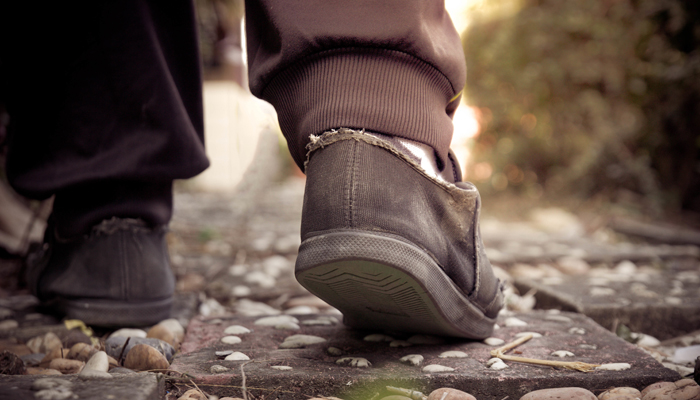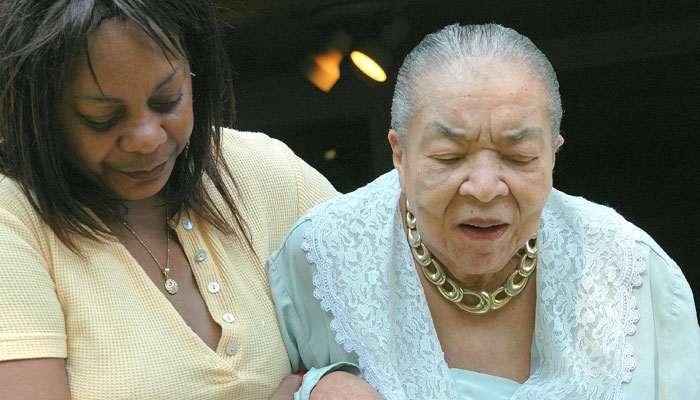Wandering
A family member’s worst nightmare is having a loved one wander off and get lost, especially on a cold night or during a heat wave. Fortunately, there are things you can do to reduce the chances of wandering. You can also have a back-up plan in case the person you care for slips out despite your best efforts.
How to discourage wandering
 It is natural to fear that a loved one with dementia may wander. Indeed, 60% of people with Alzheimer’s do get restless and head out the door. As a family member, you can’t be watchful every minute. But you can take steps to reduce the chance of wandering. The many triggers for wandering include anxiety, hunger, delusions, sleep problems, boredom, or the need to use the bathroom.
It is natural to fear that a loved one with dementia may wander. Indeed, 60% of people with Alzheimer’s do get restless and head out the door. As a family member, you can’t be watchful every minute. But you can take steps to reduce the chance of wandering. The many triggers for wandering include anxiety, hunger, delusions, sleep problems, boredom, or the need to use the bathroom.
For prevention:
- Maintain a daily schedule. Familiar routines are reassuring. Routine also helps you ensure that basic needs, such as meals and toileting, are consistently addressed.
- Keep your loved one occupied. Boredom is a common cause of wandering. A person who feels purposeful or engaged isn’t likely to wander off. Offer simple, repetitive activities, such as folding clothes or sweeping.
- Store keys and coats out of sight. Catching a glimpse of keys or outdoor coats and shoes can trigger an urge to go out. Hide them from easy viewing.
- Put indoor locks on exterior doors. Install a slide lock up high or down low (out of the usual line of vision). NEVER lock your relative inside a building all alone. If there were a fire, he or she might be too disoriented to figure out a way to escape.
- Put signs on doors. A “Stop” or “Do Not Enter” sign can be effective on exterior doors. Similarly, “Bathroom” will help guide someone who is confused and simply can’t remember which door leads to the toilet.
- Build a fence around the yard. This allows your loved one some time outdoors without the worry that he or she will leave the premises and get lost.
- Reduce nighttime restlessness. A dark room and a regular sleeping schedule with no daytime naps (or caffeine!) can help. Also, leaving water or crackers beside the bed can stem a search for a midnight snack.
Preparing for a safe return

No one can keep an eye on another person 24/7. Even in the most vigilant household, a loved one with dementia—Alzheimer’s or other memory disorder—may just find a way to slip out the door. After you have set up strategies to reduce the chance of wandering, it is also wise to pave the way for a speedier recovery if the worst occurs.
Strategies that support a quick return
- Get an ID bracelet or necklace. Be sure to note “Memory Loss” and “ICE: [your phone number].” First responders know that “ICE” stands for “in case of emergency.”
- Introduce your loved one to neighbors. Give the neighbors your phone number and ask them to call you if they see your relative out and about. You can even ask local merchants who know him or her to do the same.
- Keep a recent photo on hand. Only a recent photo—not a favorite photo from 10 years ago!—will truly help first responders if they must look for your family member.
- Make a list of possible destinations. Include your relative’s favorite places. But also list familiar places from the past: work, church, a previous residence.
- Add GPS sensors on shoes or in a bracelet. These sensors can trigger an alarm on a door and/or help locate someone who has wandered. Some require a monthly fee.
- Register with the local police and consider a Safe Return type of program. The Alzheimer’s Association sponsors a nationwide “Safe Return” program that is networked with local law enforcement. If your family member wanders, one call triggers an alert for help. A special bracelet also provides anyone finding your relative a number to call.
If your loved one does get out, spend 15 minutes looking close by. Then call 911 and any other services you have in place.
Return to topEngaging activities
Boredom or lack of engagement may lead your relative to unsafe activities, such as wandering. Or to activities that frustrate you, such as “reorganizing” the dresser or tearing bits of paper. Or to a change in mood that may bring on agitation or depression.
Activities are important.
They answer core human needs for
- identity and personal expression
- life purpose and meaning
- connection with others
Activities don’t have to be overtly productive.
You can have the same laundry basket of towels that need folding over and over. Perhaps alternate now and then with a basket of old socks. It’s a matter of matching the task with your relative’s interest, ability, and attention span. If he or she worked in an office, for instance, provide a desk and papers to “organize.” If woodworking was a hobby, have some blocks on hand that need sanding.
Activities can be
- task oriented: getting dressed, setting the table, sweeping the steps, dressing a doll
- physical: taking a walk, washing the car, dancing, singing, clapping
- creative: coloring, telling stories, making cards, stringing beads
- mental: reading, doing simple puzzles, watching a nature video, playing bingo
- social: having a visitor, going to church, reviewing old photos
Ideally, create a daily routine for your loved one.
Provide a balance of activity and relaxation. Too much activity itself causes stress. Remember that tasks of personal care, such as bathing and dressing, are activities, too.
Contact us at 707.364.5285

